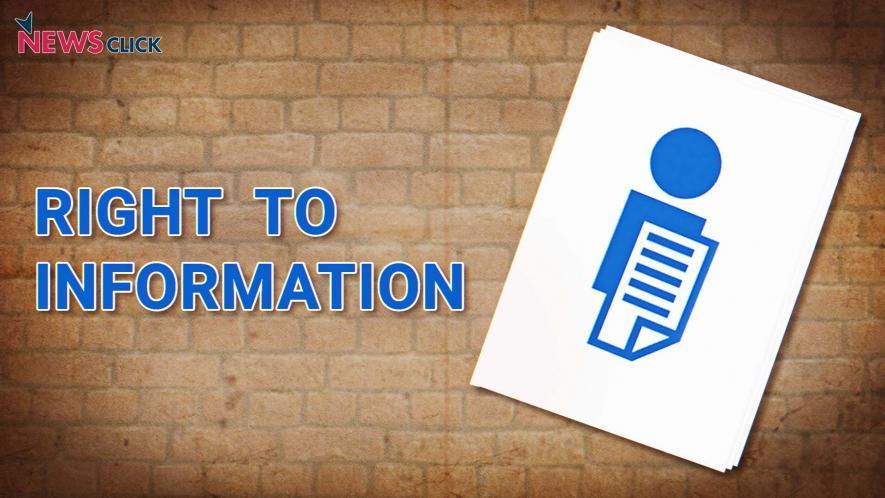What Explains Sharp Decline in RTI Applications in Jammu and Kashmir

Arsheed Ahmad and six of his friends from Chandergeer village in North Kashmir’s Bandipora district have moved heaven and earth in the last 18 months. They want information under the central Right to Information Act, passed by Parliament in 2005, about some government-run projects and schemes in their village. But obtaining this information has proved impossible.
Arsheed, Showkat, Irshad, Nissar, Nazir, Manzoor and Firdous Ahmad want basic details about a handful of schemes to conduct a “social audit of all government schemes since 2010.” The information they want is innocuous, such as how many people in Chandergeer (and the adjoining habitation, Chak Chandergeer) could access funds to construct Swachch Bharat Mission toilets. But the Block Development Officer at Hajin, who is also the Public Information Officer under the central RTI Act, has been denying these details. An order from the Central Information Commission in New Delhi, which has become the final arbiter of RTI applications in the erstwhile state, also did not help Arsheed and his friends.
A Commonwealth Human Rights Initiative study reports a 31.44% decline in RTI applications filed in Jammu and Kashmir in 2021-22. Based on the CIC’s annual report, the study found that in just that one year, RTI applications fell from 1,603 to 1,099 in the former state. The experiences of Arsheed and his friends in Chandergeer—barely an hour’s drive from the capital Srinagar—make the reasons for this sudden fall clear.
The problems with RTI in Kashmir began after August 2019 when the Centre revoked the special status of Jammu and Kashmir and carved out two new Union Territories, taking away its full-fledged statehood. Ever since, the central RTI Act passed in 2005 applies to the State instead of the RTI law passed by the State in 2009. This change has clogged the wheels of the bureaucracy, resulting in a rapid decline in interest in filing RTI applications.
There is another reason, Arsheed suspects, for the refusal to reveal names of beneficiaries of government schemes and details of funds allocated to their village though the law stipulates a 30-day limit for appeals. He says a list of beneficiaries of the Pradhan Mantri Awas Yojna and of families who took financial aid during the 2014 flood under the State Disaster Relief Fund would have been provided if the district authorities were efficient in utilising government funds.
“Funds meant for welfare have not reached people, and [that is why] the BDO is denying us these details,” he says. “There has been complete mismanagement of funds in our village for over 15 years,” he says.
The RTI Act 2005, which now applies to Jammu and Kashmir cannot come to their rescue, because, unlike the RTI Act 2009 which applied to Jammu and Kashmir before it lost statehood, it does not have a provision for time-bound appeals. This also explains why Arsheed’s appeals to senior officers and the CIC failed.
On 9 January 2022, Arsheed appealed to the Assistant Commissioner Development of Bandipora district, the district’s First Appellate Authority, against the denial of information by the BDO. He also sought action against the Public Information Officer in Hajin. But when the Assistant Commissioner asked the BDO to appear for the hearing—a month later on the morning of 8 February 2022—he simply didn’t turn up.
Rasheed then appealed to the Additional District Development Commissioner, or ADDC, who also asked the BDO to provide the information sought. The BDO ignored this order as well. Finally, on 4 March 2022, Arsheed appealed to the CIC in New Delhi. The case came up for a hearing after 13 months, on 5 April 2023. This time, the BDO turned up for the online hearing, and was directed to provide the information for the third time. The CIC also ruled that the appellants could inspect the documents related to the information they wanted. On 19 April 2023, CIC YK Sinha directed the PIO to apprise Arsheed, within two weeks, of “action already taken with respect to the supply of information”.
But once the hearing was over, the BDO failed Arsheed and the residents of Chandergeer again. The experience has left Arsheed and his friends demoralised. Still, he applied against the non-compliance of the BDO with the CIC in Delhi. Now, he expects another long wait before the case comes up for a hearing.
“Government officers in Jammu and Kashmir are least bothered about the central RTI Act passed in 2005 or CIC orders. My non-compliance application will take another year to get listed. It is so demoralising that RTI applications are declining in Jammu and Kashmir,” he says.
The sharp decline can be linked to the repeal of the Jammu and Kashmir RTI Act, passed in 2009 by the legislature of the erstwhile state. Once statehood was revoked, the State Information Commission was closed, and, ever since, there have been complaints of delays in deciding appeals at the CIC.
RTI activist Badrul Dujja, a practising lawyer in the District and Sessions Court at Srinagar, says it takes 15 to 18 months to list an appeal with the CIC, whereas in the erstwhile state, the State Information Commission would take care of appeals in 60 to 120 days. “If a villager is not provided information about the amount spent on a toilet in his village even after 18 months, how do we imagine people would continue using the RTI Act in Jammu and Kashmir?” Dujja says.
He also reminds that people are reluctant to file RTI application in Jammu and Kashmir because appeals in the CIC take a year and a half to start being heard.
No Information Commission in Union Territories
Union Territories do not have independent information commissions but are clubbed with the CIC in Delhi. The burden on the CIC increased after Jammu and Kashmir was reduced to a Union Territory.
“The CIC is not at fault because they have to look after RTI appeals against all the central ministries and departments plus the Union Territories. RTI appeals from Jammu and Kashmir are an extra burden on them. I wish our state information commission is restored and we no longer have to appeal at the CIC,” Dujja says.
“Shortcomings in the central law were kept out of the Jammu and Kashmir law, which provided for time-bound disposal of appeals within 60 to 120 days in the State Information Commission,” says Mushtaq Ahmad, a prominent RTI activist from Central Kashmir’s Budgam district.
Before August 2019, Jammu and Kashmir had its own information commission under its own RTI law. Many say that law was better than the central law because it trailed the law Parliament passed by four years.
In the erstwhile state, the RTI law gave the First Appellate Authorities the power to recommend penalising errant PIOs, another provision absent in the central law. Mushtaq says he filed two appeals before the CIC two years ago, but the first case was heard 17 months later. Despite the CIC order favouring him, the public authorities he sought information from—the Deputy Commissioner’s Office in Budgam and the Director of Rural Development in Kashmir—failed to comply.
Fed up with the long delays, Mushtaq didn’t file a non-compliance complaint. “Since the last year, I have filed very few RTI applications and never appealed before the CIC as it is too time-consuming,” he says.
A few years back, RTI activists in Maharashtra served a legal notice to their State Information Commission asking for a roadmap to handle appeals on time. More than 58,000 RTI appeals were pending before the Maharashtra SIC at the time. Tragically, this was not so with the SIC of Jammu and Kashmir until Article 370 was read down.
While the central government claimed in an April 2023 press release that there were only 300 pending RTI appeals in Jammu and Kashmir, it also reports 844 registered RTI applications in 2020-21, of which 301 were disposed. But in 2021-22, 297 new applications were filed, of which less than half the previous number—only 114—were disposed. There was also no mention of how much average time it takes to handle each appeal.
The author is a Srinagar-based columnist and activist. He is the founder and chairman of the Jammu and Kashmir RTI Movement. The views are personal.
Get the latest reports & analysis with people's perspective on Protests, movements & deep analytical videos, discussions of the current affairs in your Telegram app. Subscribe to NewsClick's Telegram channel & get Real-Time updates on stories, as they get published on our website.
























